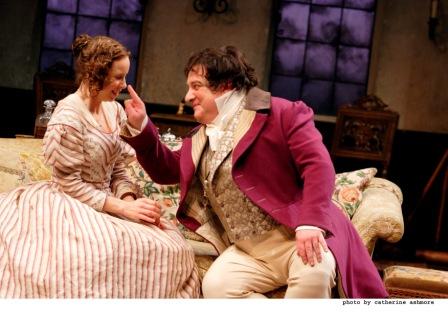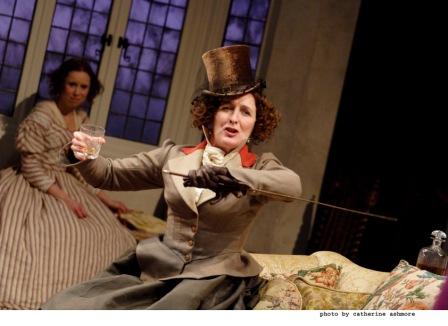Theater Review: An Antic ‘London Assurance’ from NT Live

London Assurance: Sir Harcourt Courtly (Simon Russell Beale) tickles the nose of his intended, Grace Harkaway (Michelle Terry)
London Assurance by Dion Boucicault. Directed by Nicholas Hytner. The National Theatre production presented by NTLive at the Coolidge Corner Cinema, Boston, MA, July 14.
A bonus simulcast has been added to the NTLive lineup; on July 14th Coolidge Corner Cinema will, once again, simulcast Dion Boucicault’s comedy London Assurance starring Simon Russell Beale and Fiona Shaw.
Reviewed by Bill Marx
In an interview during the June 28th live broadcast of the National Theatre’s hit production of London Assurance screened at the Coolidge Corner Cinema, NT director Nicholas Hytner referred to Dion Boucicault’s 1841 comedy as “inspired hackwork” that only aims to please. The Boston audience members murmured with warm if ironic appreciation: it is refreshing, even surprising, to hear a director for once speak the depreciating truth. But in this case it really didn’t matter—we were all in on the joke from pretty much the beginning.
The punch line, and the reason that the show has been sold out in London for months, is that Boucicault’s 19th century hackery provides a robustly nonsensical opportunity for two superb performers, Fiona Shaw and Simon Russell Beale, to let loose their comic wiles and whimsy. And run wild they do, with a hilarious range of absurd laughs, bizarre vocal tics, and silly walks. In the old days, you would have said Shaw and Beale chew up the scenery, but in this new technological age, the more appropriate description would be that they whip the broadcast waves into a frothy frenzy.
Hytner is right about London Assurance. It is not so much a play as a wind-up toy, the city swells/country bumpkin stereotypes steaming about the set like Energizer Bunnies, occasionally bumping into each other for the purposes of pitching woo or shooting off a musket. An ambitious eighteen-year-old desperate to come up with a hit, Boucicault revs up his gift for magpie cleverness: he recycles, rejiggers, and revamps giggly situations from Restoration comedy and whatever else he could xerox.
Some of the dated material and rough spots in the original have been smoothed over in this production by Richard Bean, but Boucicault’s “anything for a laugh” spirit remains, and it is that gut-bucket license to go over-the-top that gives Beale, Shaw, and other members of the cast permission to have the fun that they do.
At the center of Boucicault’s comic mechanism is Beale, who plays Sir Harcourt Courtly, would-be fashion plate, myopic popinjay, and hard-working narcissist. He is all set to marry Grace (Michelle Terry), a wealthy and attractive woman decades younger than he is who lives on a country estate. A wised-up modern female, Grace figures that she should just get marriage over with, even if it means marrying somebody she doesn’t love. Courtly thinks his son, Charles Courtly (Paul Ready), is a studious nerd, but he’s really a debt-ridden libertine who befriends the mischievous scalawag Richard Dazzle (Matt Cross) during a drunken romp. In effort to elude their creditors, the pair head for Sir Harcourt’s wedding at the rural manse.

Fiona Shaw's Lady Gay Spanker: Not so much a character as a one-woman stampede
But once there Charles falls for Grace and, in an effort to stop the marriage and assist his romance, he manages to convince his father that he is a man who only looks like his son. Meanwhile, Sir Harcourt falls for the more mature, and married, Lady Gay Spanker, a geyser of boisterous glee who sees existence through the prism of fox hunting. Various attempts at seduction, elopement, and dueling run riot. Festooned around the edges are dry-witted servants, servile lawyers, doddering husbands, and a big rat that skitters about at embarrassing points in the action.
The plot, such as it is, is only an excuse to see Beale create a memorably roly-poly monster of brazen self-regard, a swishy, campy send-up of effeminate uppityness. The amusement is to be found in Beale’s lovingly inventive details, his slow burn double takes (he scrunches up his face in a dozen different ways), high pitched laugh, and nimble physical contortions, including some nifty dance steps. Fiona Shaw supplies similarly bright, cartoon bling as Lady Spanker, hooting and hollering her way though the play as if she was the Annie Oakley of the English countryside. She is not so much a character as a fun-loving stampede, the life force as mistress of the hunt. Shaw is the butch counterpart to Beale’s hyper-affected snob.
The cast provides ace support, especially the minimal clowning of Richard Biers as the fussy Adolphus Spanker and Nick Sampson as the appropriately named servant Cool, the character’s impeccable sangfroid dedicated to maintaining the self-delusions of his master to the bitter end.
The production is staged in the very large Olivier auditorium at the National Theatre, so Hytner understandably directs the performances to reach up to the balcony. That raises an issue (aesthetic as well as technological) that I brought up about the hybrid live broadcast form in my review of the NT’s The Habit of Art earlier this year. Because the viewer is at the mercy of where the director chooses to point the camera, his or her eye can’t wander away from the action, especially during close-ups.
Beale and Shaw are wonderful, but sometimes you want some distance from their antics, a respite from the gusto or a chance to look at other performers to see how they are reacting. But that freedom clashes with our TV-ized sensibility, which dictates that our gaze always be directed at who is speaking. Also, at times the London audience began laughing at something on stage that it could see but we, in the movie theater, couldn’t, such as a rat running around the stage.
Still, we are witnessing the early and exciting evolution of a new way to watch theater, a form that that gives people around the world a chance to see first rate plays and performers. The NT’s live broadcasts have been a great success; an enticing new line-up of productions has been announced for next year, including Danny Boyle’s staging of a new version of Frankenstein, and Complicite’s A Disappearing Number. I have no doubt that other theater companies will take advantage of the electronic global outreach. A popular playwright to the tips of his toes (and wallet), Dion Boucicault would have been delighted at the prospect of a theater with thousands and thousands of virtual seats.
